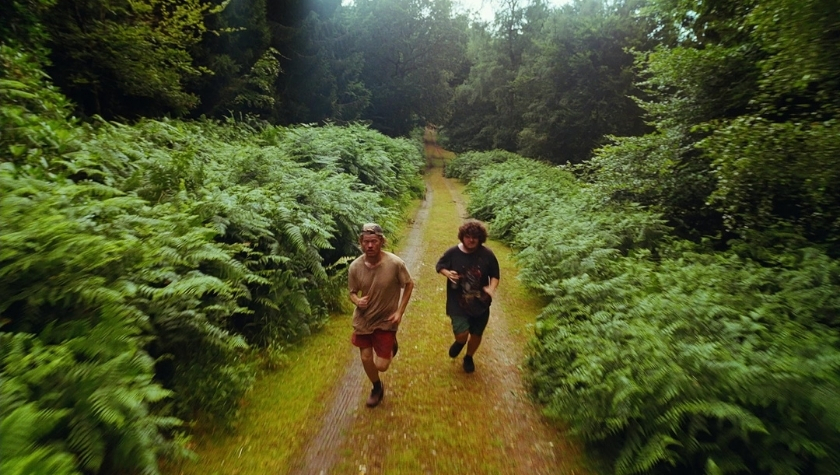Yorgos Lanthimos has never ceased to amaze his audiences with his creative and unique films. As much as his movies have been hard to explain, they still find audiences and achieve commercial and critical acclaim. His films have been nominated several Academy Awards with Emma Stone (Poor Things) and Olivia Colman (The Favourite) having both won Best Performance by an Actress in a Leading Role.
Bugonia is Lanthimos’s latest movie and follows a conspiracy-obsessed man who, after diving deep into his own internet research, believes Michelle (Emma Stone), a CEO of a company, is an alien devising a plan to destroy humanity. Wanting to meet with the alien emperor and ensure the safety of the planet, he and his brother kidnap Michelle believing she can set up that pivotal meeting.
Lanthimos uses empathy, slow information reveals and our own personal baggage to build a mystery and keep the audience guessing and engaged. Here are some ways he accomplishes it.
The Protagonist
As crazy as it all sounds from the beginning, the audience is primed to empathize with Teddy (Jesse Plemons) and go along for the journey. Why should we believe him? Because he’s the hero of the story. Writer Will Tracy and Lanthimos show how Teddy’s past sets him up on the search for answers, and how it leads him to a wild conclusion.
“I don’t think the movie would make much sense or be of much interest if he were just crazy or wrong or stupid or immoral,” writer Will Tracy said in an interview with the Motion Picture Association.
Lanthimos said in the same interview, “I don’t think the film would work if you didn’t feel at some point some empathy for Teddy’s character. It also comes through Don’s character and their relationship. You see the love between them.”
Don (Aidan Delbis) is Teddy’s cousin who he manipulated into helping him. While the audience feels bad for Don, as Lanthimos says, there is an element that Teddy believes whole-heartedly in the alien plot and that what he’s doing is the best thing for the planet.


Building a Mystery
Is Michelle an alien? Perhaps that’s the genius behind Lanthimos’s story. Teddy is the person who explores the dark recesses of the internet and gets himself stuck in the belief that aliens want to destroy humanity by killing off the bees, enslaving mankind in menial jobs and wrecking communities.
What’s strange is how Tracy and Lanthimos get you to believe, if only for a little bit, that this might actually be real. By creating a painful past, it’s conceivable that Teddy went looking for answers and found himself in an echo chamber. Many of his grievances make sense, and show parallels into our current environment - by hearing him out, the audience slowly gets on his side.
As Teddy does things like shave her head, cover her with antihistamine cream and torture her, Michelle pleads for her life insisting she’s not an alien. Yet, a part of us wants to believe that Teddy’s determination isn’t all for naught.
“I don’t think it’s the main point of the film to figure out who is right and who is wrong,” said Lanthimos to the Motion Picture Association. “Even the nicest people can do horrible things if the circumstances are correct.”
It doesn’t matter if Teddy is right or wrong, it’s his unwavering belief that keeps the mystery alive.
How Ambiguity Keeps Us Guessing
What kind of world are the characters living in? While it seems as if they live in the present times, there isn’t a specific indication that it is. There are moments it feels like a few years ahead of our time, perhaps in a community that has seen much better days. A corporate entity promises hope, but our protagonist stirs doubt.
When the movie starts, the kidnapping plot is set in motion and the two kidnappers are preparing to go. Because Teddy and Don are the only ones Lanthimos presents to us, the audience sees the world through a fragmented lens.
Ambiguity keeps the audience wondering if the conspiracy theory is true, and how and when the truth will be revealed.


Root for the Truth
At some point, the audience empathizes so much with the characters and the situation, they struggle to root for a specific person. It’s not that we want Teddy and Don to be right or wrong, we’re on the journey to discover the truth.
Lanthimos constantly gives new information or insights for the audience to question what’s real while also providing red herrings to throw us off track.
Without giving anything away, at some point a character feels admiration toward another one changing the dynamic of all three people’s relationship with each other and the truth. But pay attention, it doesn’t provide answers but only deepens the mystery.
It’s a Dark Comedy
Lanthimos has found his niche in creating dark comedies that are strange and provide a unique perspective of the world. Poor Things and The Lobster both find its characters navigating an unconventional world that is humorous but not quite ‘laugh out loud’ funny. He has become the modern-day master of dark comedy while exploring madness and absurdity with real parallels into people’s lives.
Dark comedies are frequently uncomfortable and highlight the absurd.
- The War of the Roses – A married couple fight each other as they try to get the upper hand as their marriage dissolves.
- Fargo – A husband gets in over his head when he hires two violent idiots to kidnap his wife.
- The Lobster – Single people find themselves at a resort as a “last resort” for finding true love. Failure to do that means they will turn into an animal.
Just like Bugonia, the comedy is often more situational and less jokes. The humor is in the bizarre way characters interact with the world without ever winking toward the audience. The absurdity of a dark comedy makes it harder to determine the truth because the genre doesn’t necessarily allow for logic. Because anything goes, the audience will refuse to believe they know how the movie and the alien conspiracy will unfold.


Lanthimos Wants You to Bring Your Baggage
“This is a film about people who are trying to convince each other of their worldview. As each layer is revealed about the characters, who you believe in a given situation changes. You find yourself trying to figure out where you stand throughout the entire film,” Lanthimos says in a Roger Ebert interview. “I think the structure I’ve created has allowed the audience to be very personally engaged and bring their own baggage into the film. I’m inviting them to bring themselves into this story and to think and perceive about this ever-shifting situation within the narrative.”
Bugonia uses the alien conspiracy theory to tell a story about uncertainty and the search for answers. When people don’t know where to turn or life becomes too traumatic, they can be manipulated into believing external forces are waging a war against them. Lanthimos uses this to build a mystery that forces the audience to guess until the end, and then guess some more.

